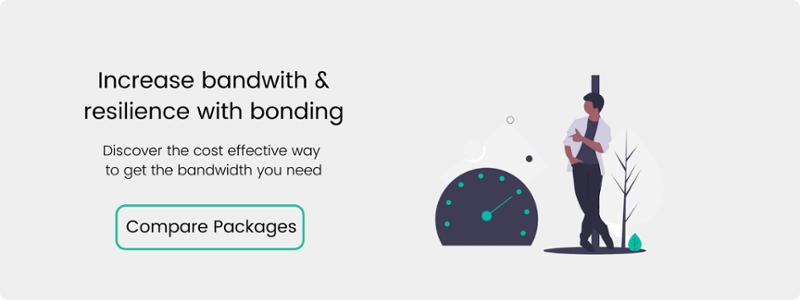Internet bonding
A bonded internet connection is a setup that joins two or more internet connections into one through a single router. The benefit of joining multiple links into one like this is that it creates bonded broadband a single, super-fast connection.
For example, you could bond two separate 1Gbps download and upload internet connections. The result would be a single internet connection with a download and upload speed of 2Gbps.
Why use a bonded internet connection?
There are various reasons businesses use internet bonding. Still, one of the most common business purposes is to gain a fast connection in a location with limited infrastructure to have a single connection of the desired speed. These businesses include those situated in remote areas where access to fast internet connections is minimal. Their only options are to use bonded internet or microwave internet.
Another type of business that is likely to use bonded internet relies heavily on its internet connection to function. This reason is that internet bonding does more than just provide faster upload and download speeds. It also reduces the risk of downtime, where the business stops operating, and everyone twiddles their thumbs as you try to get your internet company to fix the issue.
Which internet connections are suitable for bonding?
Virtually any of the modern internet connection types can be bonded together, including:
- Fibre
- 4G and 5G
- FTTP
- FTTC
- ADSL
- Fixed Wireless Link, also known as Microwave Internet
- Any Ethernet service
Businesses that require ultra-fast internet with zero downtime will often bond a leased fibre line with a microwave internet connection. This network type will allow speeds of up to 20Gbps and virtually eliminate the risk of downtime.
Benefits of choosing bonded internet connections for businesses
The key benefit of choosing to bond a microwave internet connection with a leased line is that you get outstanding resilience from using two entirely different links simultaneously. As you may be aware, leased lines are at risk of damage when there is flooding because the infrastructure is based on the ground. Things like fire and damage from construction work are also risks and, though these things don't happen every day, they can lead to lengthy downtime when they do.
By bonding two leased lines together, you will get quick connection speeds, but there is always the risk of both going down simultaneously. Choosing a microwave connection instead means you get a similar connection speed to a fibre leased line, but your relationship is not at risk from the things that threaten leased connections. The connection is delivered through the air, so there is less that can go wrong
Bonding a leased line with microwave internet gives you faster internet and minimal risk of downtime - it's the best of both worlds.
.jpg?width=1920&name=israel-andrade-YI_9SivVt_s-unsplash%20(1).jpg)
What happens when a connection goes down?
If one of the connections has a fault the bonded internet technology will revert to using the other working connection. It will deliver no traffic through the broken link until the issue is resolved. This way, no data is lost, but your connection speed will slow down until the second connection is back online.
If you use a fully managed service, you will monitor your bonded connection around the clock; this ensures any faults are resolved before they cause any problems for your business.
What's the difference between bonded internet and load balancing?
The principles of internet bonding and load balancing are pretty similar, but there are some key differences. Fundamentally, bonding combines two connections, while load balancing uses one of the two connections simultaneously, keeping the other in reserve as a backup.
Crucially, load balancing will not boost the speed of your internet connection. But it helps prioritise access to the internet for specific locations or users when the link becomes too busy.
Do you use different IP addresses for bonded connections?
Businesses can establish a bonded connection to use only a single IP address, whether one or both of the links are in use. This helps avoid downtime that would otherwise need to happen through a dynamic IP refresh. It is also essential when you are using a CCTV system.
However, businesses don't always want their connection set up with a fixed IP. When you have a company bonding your connections, it's essential to let them know whether you prefer to have a single IP or separate IPs before starting the work.
Are you looking for bonded internet for your business?
If a bonded internet connection your business needs, please don't hesitate to give our friendly team a call. We will be able to provide you with a free, no-obligation quote and answer any questions you may have.
.png?width=200&height=75&name=Amvia%20New%20Header%20Logo%20(11).png)



.png)